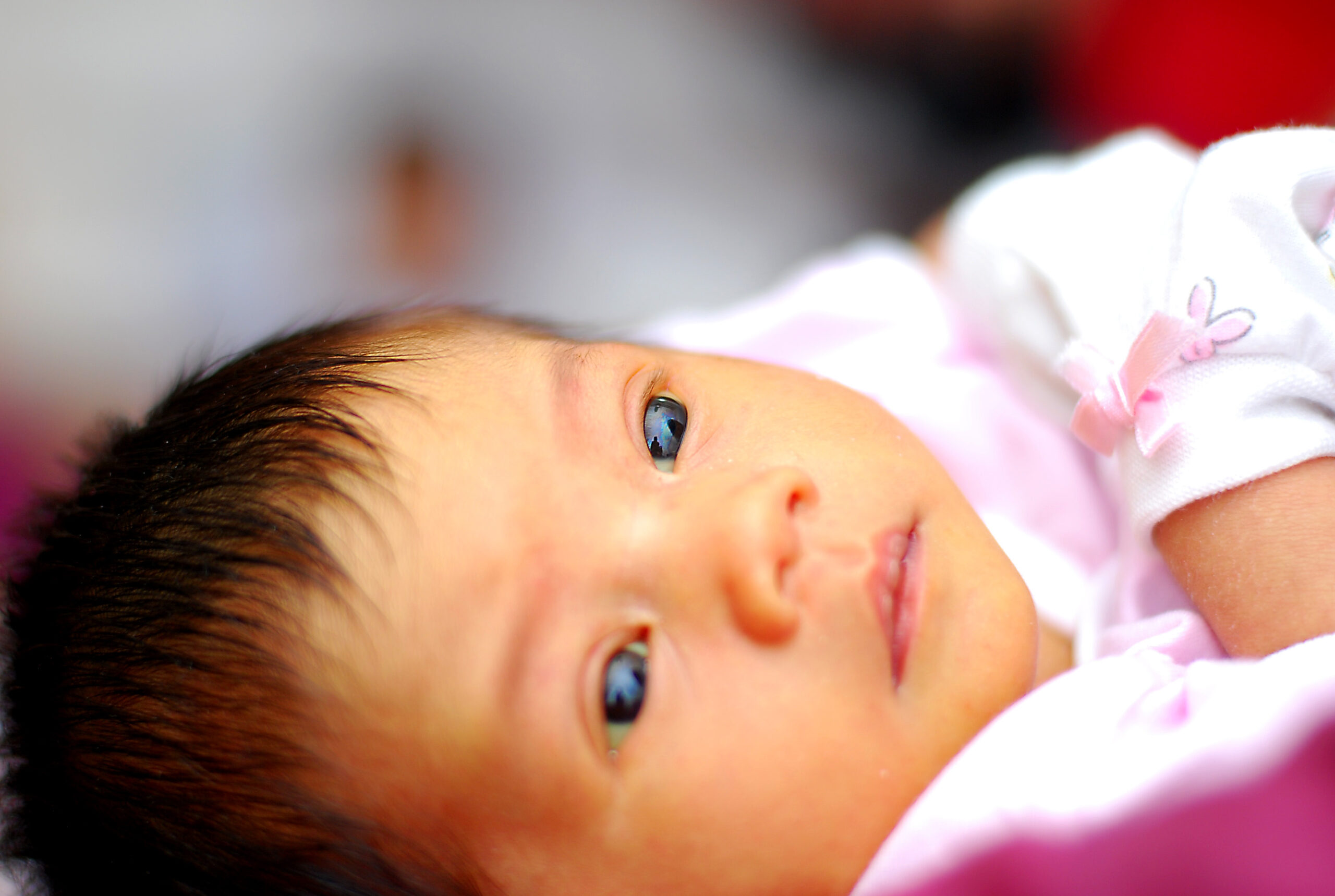Jaundice in a newborn baby is the yellow coloring of their skin and the whites of their eyes. It is common in babies and is not the same as jaundice in adults. The medical term for jaundice in babies is neonatal jaundice. If your baby has jaundice, they need to be seen by a health care provider. Your baby may look jaundiced on their first or second day of life. Often you will not see it until the second or third day. Jaundice will often go away over one to two weeks (3 weeks for preterm babies) and does not cause any long-term problems for most babies. Sometimes jaundice needs to be treated (see below). Breast milk jaundice may develop 5–7 days after birth and is a harmless type of jaundice. There is no need to stop breastfeeding. Check with your health care provider if you think your baby has breast milk jaundice.
Signs and symptoms
A baby with jaundice has skin that looks yellow. It starts on the face, then the chest and stomach, and then the legs. The whites of a baby's eyes also look yellow. Babies with very high bilirubin levels may be sleepy, fussy, floppy, or have trouble feeding.
Jaundice may be hard to see, especially in babies with dark skin. If you're unsure, gently press the skin on your baby's nose or forehead. If it's jaundice, the skin will appear yellow when you lift your finger
When to see a doctor?
Most hospitals have a policy of examining babies for jaundice before discharge. Your baby should be examined for jaundice between the third and seventh day after birth when bilirubin levels usually peak. If your baby is discharged earlier than 72 hours after birth, make a follow-up appointment to look for jaundice within two days of discharge.
The following signs or symptoms may indicate severe jaundice or complications from excess bilirubin. Call your doctor if:
- Your baby's skin becomes more yellow
- The skin on your baby's abdomen, arms, or legs looks yellow
- The whites of your baby's eyes look yellow
- Your baby seems sick or is difficult to awaken
- Your baby isn't gaining weight or is feeding poorly
- Your baby makes high-pitched cries medical care if you have severe vaginal bleeding or sharp pelvic pain that comes on suddenly.
نوزائیدہ بچے میں یرقان
نوزائیدہ بچے میں یرقان کی علامت ان کی جلد کا اور ان کی آنکھوں کا رنگ زرد ہونا ہے۔ یہ بچوں میں عام ہے اور بڑوں میں یرقان سے مختلف ہے۔ اگر آپ کے بچے کو یرقان ہے تو اسے فوری ڈاکٹر کو دکھانا چاہیے۔ آپ کا بچہ اپنی زندگی کے پہلے یا دوسرے دن یرقان کا شکار ہو سکتا ہے اور اکثر دوسرے یا تیسرے دن تک نہیں ظاہر ہوتا۔ اکثر اوقات یرقان ایک سے دو ہفتوں (قبل از وقت بچوں کے لیے 3 ہفتے) میں ختم ہو جاتا ہے اور زیادہ تر بچوں کے لیے طویل المیعاد مسائل پیدا نہیں کرتا۔ بعض اوقات یرقان کا علاج کرنا پڑتا ہے۔ ماں کے دودھ کا یرقان پیدائش کے پانچ سے سات دن بعد پیدا ہو سکتا ہے اور یہ ایک بے ضرر قسم کا یرقان ہے۔ ماں کے دودھ کو روکنے کی ضرورت نہیں ہے۔ اگر آپ کو لگتا ہے کہ آپ کے بچے کو ماں کے دودھ کا یرقان ہے تو اپنے ڈاکٹر سے رجوع کریں۔
نشانات و علامات:
یرقان میں مبتلا بچے کی جلد پیلے رنگ کی ہوتی ہے۔ یہ چہرے سے شروع ہوتی ہے، پھر سینے اور پیٹ اور پھر ٹانگوں میں ظاہر ہوتی ہے۔ بچے کی آنکھوں کی سفیدی بھی زرد نظر آتی ہے۔ بہت زیادہ بلیروبن لیول(bilirubin level) والے بچے نیند ، بے چینی یا دودھ پلانے میں دشواری کا شکار ہو سکتے ہیں۔ اگر آپ کو یقین کرنا ہے تو اپنے بچے کی ناک یا پیشانی پر جلد کو دبائیں۔ اگر یہ یرقان ہے تو جب آپ انگلی اٹھائیں گے تو جلد زرد نظر آئے گی۔
ڈاکٹر سے کب ملنا ہے
بیشتر ہسپتالوں میں بچوں کو یرقان کے لیے گھر بھیجنے سے پہلے جانچنے کی پالیسی ہوتی ہے۔ آپ کے بچے کی پیدائش کے تیسرے اور ساتویں دن کے درمیان یرقان کی جانچ کرائی جانی چاہیے ، جب عام طور پر بلیروبن کی سطح عروج پر ہوتی ہے۔ اگر آپ کے بچے کو پیدائش کے 72 گھنٹوں سے پہلے ڈسچارج کر دیا جاتا ہے تو ، گھر آنے کے دو دن کے اندر یرقان کی جانچ کے لیے فالو اپ اپائنٹمنٹ لیں۔ مندرجہ ذیل علامات شدید یرقان یا اضافی بلیروبن کی پیچیدگیوں کی نشاندہی کر سکتی ہیں۔ اپنے ڈاکٹر کو کال کریں اگر:
-آپ کے بچے کی جلد زیادہ زرد ہو رہی ہے۔
-آپ کے بچے کے پیٹ ، بازو یا ٹانگوں کی جلد زرد نظر آتی ہے۔
- آپ کے بچے کی آنکھوں کی سفیدی زرد نظر آتی ہے۔
-آپ کا بچہ بیمار لگتا ہے یا اسےنیند سے بیدار کرنا مشکل ہے۔
-آپ کے بچے کا وزن نہیں بڑھ رہا ہے یا وہ کم دودھ پی رہا ہے۔
-آپ کا بچہ اونچی آواز میں چیخیں مار کے روتا ہے
Doctors to consult (Paediatrician):
Dr. Rabia Safdar Saleem, Dr. Waheed Ahmed, Dr. Zafar Iqbal
Note: Click the Doctor's name to make an appointment.
Reference:
https://www.hopkinsallchildrens.org/Patients-Families/Health-Library/HealthDocNew/Jaundice-in-Healthy-Newborns
https://www.health.qld.gov.au/__data/assets/pdf_file/0010/142300/c-jaundice.pdf
https://patient.info/childrens-health/neonatal-jaundice-leaflet
https://www.mayoclinic.org/diseases-conditions/infant-jaundice/symptoms-causes/syc-20373865

